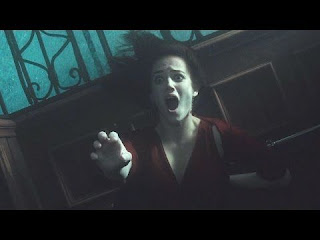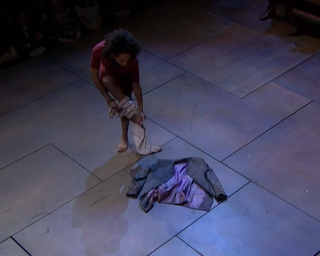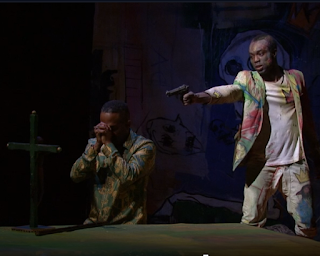Act IV, scene vii: Melodious lay to muddy death
The final scene of Act IV sees Claudius and Laertes concoct a murderous double-poisoning plot against Hamlet, and the Queen brings news of Ophelia's death.
Before the scene begins it seems that the King has been telling Laertes his version of Polonius' death, along with his belief that he, Claudius, was his next target. Claudius gives a couple of reasons for not already having taken more extreme measures against Hamlet: firstly to please Gertrude, and then through a second reference to Hamlet's popularity with the people, the 'great love the general gender bear him' (IV.vii.18).
But there is emphasis on action, and that action springs from Laertes, 'my revenge will come' (IV.vii.29); 'devise it so/That I might be the organ (IV.vii.68-69) from Laertes, and Claudius, in the business of egging him on, 'That we would do/We should do when we would' (IV.vii.117-118). Unlike Hamlet of course, who didn't avenge his father's death by killing Claudius when he had the chance.
According to Claudius, what has made Hamlet envious of Laertes is the news of his swordmanship, and so a duel is necessary. First Claudius suggests that Laertes should choose an unblunted foil; then Laertes proposes that he will anoint this 'unbated' (IV.vii.137) tip with a poison ('unction') so toxic that there is no known antidote. Just for good measure, Claudius also promises to mix a poisoned chalice that will be given to Hamlet when he calls for refreshment 'if he by chance your venom'd stuck' (IV.vii.160). Not much chance of escape there, then.
According to Claudius, what has made Hamlet envious of Laertes is the news of his swordmanship, and so a duel is necessary. First Claudius suggests that Laertes should choose an unblunted foil; then Laertes proposes that he will anoint this 'unbated' (IV.vii.137) tip with a poison ('unction') so toxic that there is no known antidote. Just for good measure, Claudius also promises to mix a poisoned chalice that will be given to Hamlet when he calls for refreshment 'if he by chance your venom'd stuck' (IV.vii.160). Not much chance of escape there, then.
Gertrude observes that 'One woe doth tread upon another's heel/So fast they follow' (IV.vii.162-163), and certainly that might be the audience's experience in the last two acts. The 'fantastic garlands' that accompany Ophelia's watery end have prompted much artistic interpretation, though the action takes place off stage.
In addition to your own summary and notes,
Oh, and another famous film drowning, anyone?
In addition to your own summary and notes,
- Re-read Claudius' lines that encourage Laertes to avenge his father's death. In what way might they be considered ironic?
- Is Ophelia's death suicide, or a misadventure? What does Gertrude's account suggest?
- Collect some evidence of parallels in the play; particularly Hamlet's 'assumed' madness contrasted with Ophelia's 'real' madness, and Fortinbras and Laertes as parallels for Hamlet.
Oh, and another famous film drowning, anyone?




James Bond, Casino Royale?
ReplyDeleteWell played!
Delete